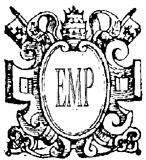SMATBaB
Penitential
£6.00
EMP1316
Byrd, William
Infelix ego
SMATBaB
Penitential
£6.00
EMP0560
Lassus, Roland de (Orlandus Lassus, Orlando di Lasso)
Infelix ego
SAATBaB
Penitential
£4.75
EMP0493
Willaert, Adrian
Inviolata, integra et casta es Maria
SSMATTB
Mary Sequence, Marian Feasts
£4.75
EMP1180
Victoria, Tomas Luis de
Jesum tradidit impius (In Parasceve Resp. VIII)
AATB
Tenebrae Responsories, Good Friday (Karfreitag)
£2.50
EMP1203
Victoria, Tomas Luis de
Jesum tradidit impius (In Parasceve Resp. VIII)
SSAT
Tenebrae Responsories, Good Friday (Karfreitag)
£2.50
EMP0425
Finck, Heinrich
Jesus Christus salus nostra
SATTB
Hymn, General Use
£2.50
EMP0755
Wylkynson (Wilkinson), Robert
Jesus autem transiens/Credo in Deum
13 tenors
Non-liturgical
£2.50
EMP0756
Wylkynson (Wilkinson), Robert
Jesus autem transiens/Credo in Deum
13 tenors
Non-liturgical
£5.00
EMP0778
Merulo, Claudio
Jubilate Deo
SSATB
,
£3.00
EMP0185
Palestrina, Giovanni Pierluigi da
Jubilate Deo
SATB SATB
Psalm, Christmas
£4.00
EMP1687
Palestrina, Giovanni Pierluigi da
Jubilate Deo
SATB SATB
Psalm, Christmas
£4.00
EMP1276
Gabrieli, Giovanni
Jubilate Deo a 10 (1615)
a 10: see description
Respond, Office of the Dead
£7.10
EMP1686
Gabrieli, Giovanni
Jubilate Deo a 10 (1615)
a 10: see description
Respond, Office of the Dead
£22.50
EMP1285
Hassler, Hans Leo
Jubilate Deo a 15
a 15: see description
Psalm-Motet, Christmas
£6.00
EMP1293
Hassler, Hans Leo
Jubilate Deo a 5
SSATB
Psalm-Motet, General Use
£4.00
EMP1313
Hassler, Hans Leo
Jubilate Deo a 5
SSATB
Psalm-Motet, General Use
£4.00
EMP0832
Croce, Giovanni
Jubilate Deo omnis terra
SSB (+MATB) bc
Psalm at Lauds, Christmas
£4.00
EMP1619
Croce, Giovanni
Jubilate Deo omnis terra
SSB (+MATB) bc
Psalm at Lauds, Christmas
£3.00
EMP1633
Croce, Giovanni
Jubilate Deo omnis terra
SSB (+MATB) bc
Psalm at Lauds, Christmas
£8.50
EMP1171
Victoria, Tomas Luis de
Judas mercator pessimus (In Coena Domini Resp. V)
AATB
Tenebrae Responsories, In Cena Domini (Maundy Thursday, Gründonnerstag)
£2.50
EMP1194
Victoria, Tomas Luis de
Judas mercator pessimus (In Coena Domini Resp. V)
SSAT
Tenebrae Responsories, In Cena Domini (Maundy Thursday, Gründonnerstag)
£2.50
EMP0141
Lassus, Roland de (Orlandus Lassus, Orlando di Lasso)
Justorum animae
SSATB
Offertorium, All Saints (November 1)
£3.00
EMP1123
Lassus, Roland de (Orlandus Lassus, Orlando di Lasso)
Justorum animae
SSATB
Offertorium, All Saints (November 1)
£3.00
EMP1133
Lassus, Roland de (Orlandus Lassus, Orlando di Lasso)
Justorum animae
SSATB
Offertorium, All Saints (November 1)
£3.00
EMP0619
Szamotuł, Wacław z
Już się zmierzka
SATB
Evening use, General Use
£2.50
EMP0779
Merulo, Claudio
Laetabimur in salutari tuo
SAATBaB
Communion, Lent
£3.00
EMP0143
Lassus, Roland de (Orlandus Lassus, Orlando di Lasso)
Lagrime di S Pietro
SSAATTB
Passiontide
Manuscript edition
£20.50
EMP1230
Victoria, Tomas Luis de
Lamentations (complete)
SSAATTBB
Lesson (Lesung), Triduum sacrum (Holy Week)
£11.90
EMP0968
Croce, Giovanni
Lamentations B (Good Friday)
SATB
Lesson (Lesung), Good Friday (Karfreitag)
£4.00
EMP1299
Palestrina, Giovanni Pierluigi da
Lamentations III (Fri.)
various
Lesson (Lesung), Good Friday (Karfreitag)
£6.30
EMP0298
Palestrina, Giovanni Pierluigi da
Lamentations III (Sat.)
various
Lesson (Lesung), Holy Saturday (Easter Eve)(Karsamstag)
£7.10
EMP0296
Palestrina, Giovanni Pierluigi da
Lamentations III (Thur.)
various
Lesson (Lesung), In Cena Domini (Maundy Thursday, Gründonnerstag)
£7.10
EMP1148
Palestrina, Giovanni Pierluigi da
Lamentations Liber III
various
Lesson (Lesung), Holy Saturday (Easter Eve)(Karsamstag)
£.00
EMP1227
Victoria, Tomas Luis de
Lamentations for Good Friday
SSAATB
Lesson (Lesung), Good Friday (Karfreitag)
£5.00
EMP1228
Victoria, Tomas Luis de
Lamentations for Holy (or Easter) Saturday
SSATTB
Lesson (Lesung), Holy Saturday (Easter Eve)(Karsamstag)
£6.00


